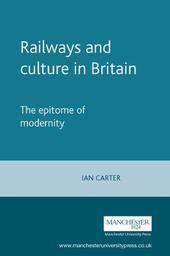
|
Railways and Culture in Britain: The Epitome of Modernity
Paperback / softback
Main Details
| Title |
Railways and Culture in Britain: The Epitome of Modernity
|
| Authors and Contributors |
By (author) Ian Carter
|
| Series | Studies in Popular Culture |
|---|
| Physical Properties |
| Format:Paperback / softback | | Pages:352 | | Dimensions(mm): Height 234,Width 156 |
|
| Category/Genre | Literary studies - general
History of specific subjects |
|---|
| ISBN/Barcode |
9780719059667
|
| Classifications | Dewey:809.93356 |
|---|
| Audience | | General | | Undergraduate | | Postgraduate, Research & Scholarly | | Professional & Vocational | |
|---|
| Illustrations |
Illustrations, black & white
|
|
Publishing Details |
| Publisher |
Manchester University Press
|
| Imprint |
Manchester University Press
|
| Publication Date |
1 September 2001 |
| Publication Country |
United Kingdom
|
Description
The 19th-century's steam railway epitomized modernity's relentlessly onrushing advance. In this work Ian Carter delves into the cultural impact of train technology, and how this was represented in British society. Why for example did Britain possess no great railway novel? The work's first half tests that assertion by comparing fiction and images by some canonical British figures (Turner, Dickens, Arnold Bennett) against selected French and Russian competitors: Tolstoy, Zola, Monet, Manet. The second half proposes that if high cultural work on the British steam railway is thin, then this does not mean that all British culture ignored this revolutionary artefact. Detailed discussions of comic fiction, crime fiction and cartoons reveal a popular fascination with railways tumbling from vast (and hitherto unexplored) stores of critically overlooked genres. A final chapter contemplates cultural correlations of the steam railway's eclipse. If this was the epitome of modernity, then does the triumph of diesel and electric trains, of cars and planes, signal a decisive shift to postmodernity?
Author Biography
Ian Carter is Professor of Sociology at the University of Auckland
Reviews"'This is an important, agenda-setting work. The quality of the scholarship is very high'. Dr Ralph Harrington, University of York"
|